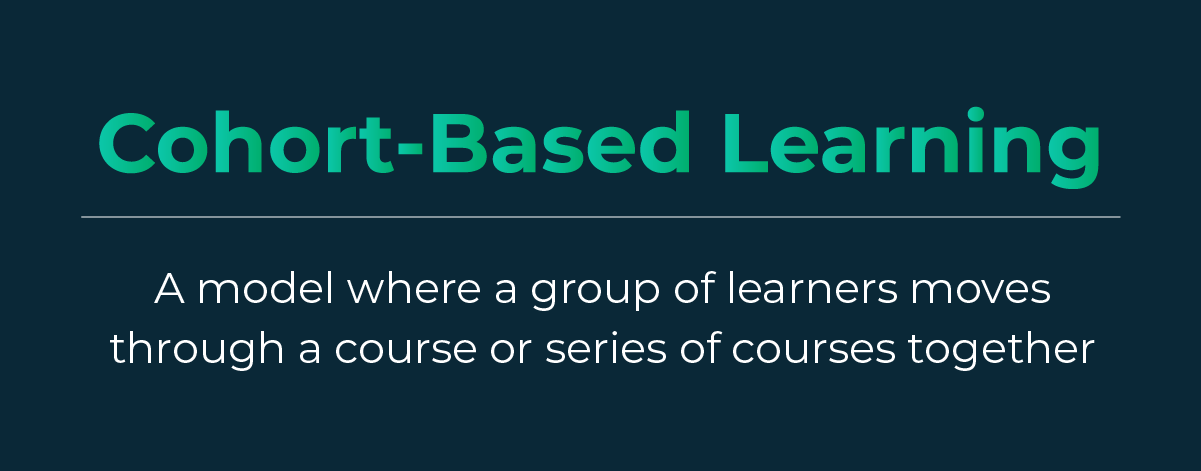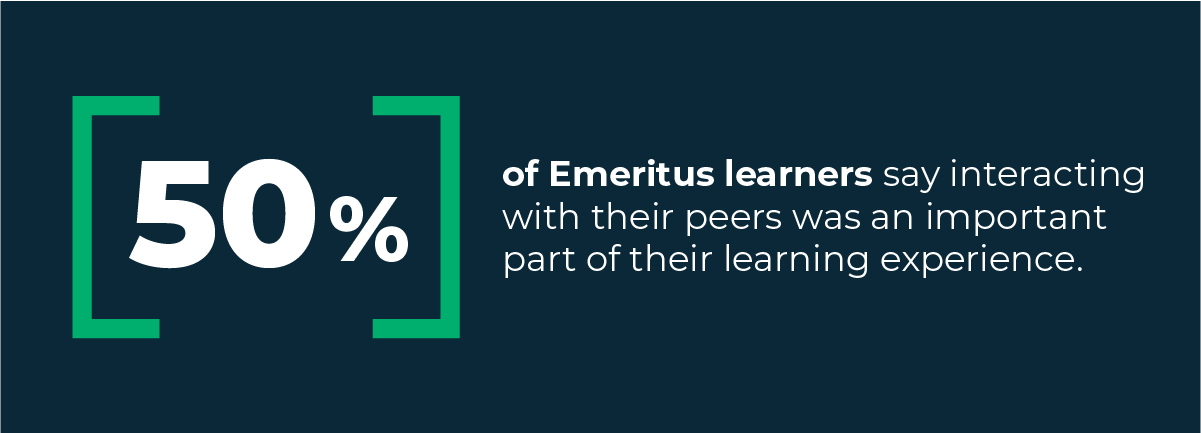5 Benefits of Cohort-Based Learning in the Workplace

From traditional degree programs to self-paced online learning modules, today’s learners have more options than ever to build on existing skills and acquire new ones.
However, online programs vary widely in quality, cost, and time commitment—and outcomes vary. For example, research has shown that massive open online course (MOOC) completion rates hover in the single digits despite major platforms’ ongoing efforts to retain students.
Cohort-based learning has emerged as a compelling model for professionals to master new skills and apply them in the real world. It combines the best of new and traditional learning models. Plus, data shows that not only do cohort-based courses have high completion rates—they also contribute significantly to participants’ career development.
What is Cohort-Based Learning?
Cohort-based learning is an educational approach in which a group of learners moves through a course or series of courses together. Today, the term cohort-based learning often refers to online or hybrid courses with collaborative elements. However, this learning model may also seem familiar to most people from school and higher education, in which classmates complete coursework and assessments at the same pace.

Many cohort-based courses, like those Emeritus offers, use a mixture of synchronous and asynchronous learning. For example, learners may watch videos, listen to lectures, or complete readings on their own time (but within a set timeframe). Then, they periodically convene via video or discussion boards to share ideas and complete interactive peer-to-peer exercises.
This allows participants to benefit from interactive learning within the context of a busy professional life.
The Benefits of Cohort-Based Courses
The design of cohort-based courses offers numerous advantages for both companies and individual learners. They include the following.
1. Increased Accountability
It might seem like entirely self-paced courses would be easier to fit around other commitments. But in reality, the lack of deadlines, feedback, and accountability to group members can make completing the coursework a real challenge.
When learners are part of a cohort and complete their assignments by specified deadlines, they are far more likely to carve out the time needed to focus on that work. Plus, keeping up with peers, especially when group work is involved, is a major driver for most participants.
2. Specificity of Course Material
Since most online learning programs are designed to appeal to mass audiences and remain relevant for an extended period of time, they tend to be quite broad in scope. The smaller audience and real-time nature of cohort-based courses (like Small Private Online Courses, or SPOCs) allow instructors and course leaders to dive deeper into focused subject matter. This makes the courses more targeted and useful for corporate learners.
Since these courses include synchronous components, they provide additional opportunities to explore current events and even specific business challenges as they unfold.
This effect is multiplied in the private cohorts offered by Emeritus. Unlike public cohort courses, which are open to enrollment for learners from any organization, private cohorts are made up entirely of learners from one team or company. This approach offers a high degree of customization and allows instructors to hone in on unique company issues. Plus, they can discuss challenges that would be too sensitive to address in an open setting.
3. Applied Learning
Since online cohort-based courses utilize more interactive teaching methodologies than lecture-style courses, they by nature prioritize applied learning. This can take numerous forms, from in-class case studies to discussion boards and group assignments that ask students to apply course concepts to real-world problems. Research shows this approach produces a deeper level of understanding and knowledge retention than traditional lectures.
Plus, the more intimate setting of small learning cohorts (especially private cohorts) gives instructors the flexibility to work one-on-one with learners to address their specific situations and provide personalized advice. Since Emeritus designs courses for professionals working to level up their skills, this approach ensures learners leave their course equipped with not only new knowledge but also the ability to apply it to their day-to-day roles.
4. Community Building and Support
Community is one of the most meaningful aspects of in-person education. And cohort-based online learning brings the power of community to a virtual environment. Emeritus courses are specifically designed to encourage engagement between learners as well as with instructors or other support resources.
They use discussion boards, group projects, and additional collaborative learning methods to ensure participants can learn from one another. With Emeritus learners living in over 80 countries and working across a wide variety of industries, learners often emerge with both a broadened professional network and new insights on familiar problems. Peer support and assistance can prove particularly motivational for learners during challenging or busy times. In fact, 50% of Emeritus learners say interacting with peers was an important part of their learning journey.

Private cohorts also offer significant benefits for teams. When teams complete courses together, they gain a shared framework and language for tackling challenges. The cohort-based learning model provides a unique opportunity for participants to work with team members in new ways and strengthen working relationships.
5. Soft Skills Development
Many of the most in-demand skills today, like critical thinking and innovation, fall into the category of “soft skills.” They are sometimes referred to as “power skills.”
Since many of these skills are best developed through practice, the more interactive model of cohort-based programs makes them more impactful than traditional learning models relying on lectures or reading. The programs that Emeritus offers in areas like leadership and innovation draw heavily on interactive work and coaching to ensure students walk away with both a deeper understanding of theory and the ability to apply it.
Effective cohort-based programs don’t just address immediate skill gaps or company needs; they also provide learners with the tools to engage in ongoing upskilling and reskilling. That’s why 94% of our past participants report that their coursework has positively impacted their career development, and 9 out of 10 agree that it has benefited their company or organization.
Cohort-Based Learning with Emeritus
Are you interested in pursuing cohort-based learning for yourself, your team, or your company? Learn more about partnering with Emeritus Enterprise, which offers online employee training programs for your workforce, or you can view our full slate of cohort-based courses for individual enrollment.

